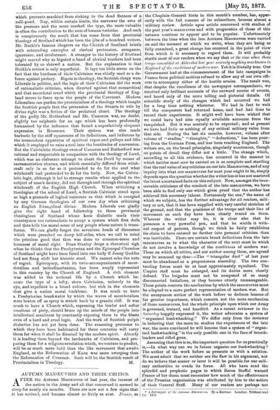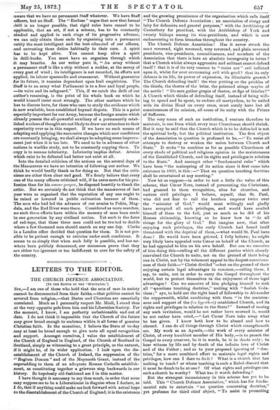AUTUMN MANCEUVRES AND THEIR crimes. A FTER the Autumn Manceuvres of
last year, the interest of the nation in the Army and all that concerned it seemed to sleep for nearly six months. There are now not a few signs that it has revived, and become almost as lively as ever. Fraser, as the Chaplain-General hints in this month's number, has, appar- ently with the full consent of its subscribers, become almost a military review. Article upon article concerned with studies of the past year's manceavres and with prognostics of those of this autumn continue to appear and to be popular. Unfortunately between the time when the late Autumn Manceuvres were carried on and the moment at which we write, when they are being so fully examined, a great change has occurred in the point of view from which it is necessary to regard them. It will probably startle most of our readers when we say that at the time when those troops assembled at Aldershot last year scarcely anything was known in England of the conditions of modern war. Yet it is literally true. Our Government had at the commencement of the late campaigns in France from political motives refused to allow any of our own offi- cers to accompany either of the hostile armies. The result was, that despite the excellence of the newspaper correspondents, we received only brilliant accounts of the outward course of events, and heard only of the more telling and pictorial details. Of scientific study of the changes which had occurred we had for a long time nothing whatever. We had in fact to wait till the conquerors had returned home, and had had time to record their experiences. It might well have been wished that we could have had also equally available accounts from the vanquished. But it was scarcely to be expected; and at present we have had little or nothing of any critical military value from that side. During the last six months, however, volume after volume of "studies," "thoughts," "deductions," has been pour- ing from the German Press, and has been reaching England. The writers are, on the broad principles, singularly unanimous, though on points of detail they differ not a little. The change which, according to all this evidence, has occurred in the manner in which battles must now be carried on is so complete and startling that the real value of any criticism on our late Manceuvres, and of any inquiry into what our manceuvres for next year ought to be, simply depends upon the question whether the writer has or has not mastered the latest ascertained facts on this subject. Now, amongst the innu- merable criticisms of the conduct of the late manceuvres, we have been able to find only one which gives proof that the author has achieved this necessary labour. Fortunately the one,* the name of which we subjoin, has the further advantage for all readers, mili- tary or not, that it has been supplied with very careful sketches of the ground, and that the positions of the troops and their line of movement on each day have been clearly traced on them. Whoever the writer may be, it is clear also that he possesses a very powerful pen, and that be wields it with- out respect of persons, though we think he fairly establishes his claim to have entered no farther into personal criticism than was inevitable. There are certain broad deductions from the late manceuvres as to what the character of the next must be which do not involve a knowledge of the conditions of modern war. These on which all critics, and our author among them, are agreed may be summed up thus :—The "triangular duel" of last year must be abandoned as a preposterous absurdity. The two con- tending forces must be at least approximately equalised. The Umpire staff must be enlarged, and its duties more clearly defined. The brigades must not be composed of so many disconnected battalions, or they become utterly unmanageable. These points concern the mechanism by which the manceuvres must be adapted to a more perfect representation of modern war. But the anonymous author of the work before us deduces lessons of far greater importance, which concern not the mere mechanism of these manceuvres, but the whole principle upon which our Army is governed, trained, and handled. As a recent reviewer in the Saturday happily expressed it, the writer advocates a system of "organised bushwhacking." We differ only from the reviewer in believing that the more he studies the experiences of the late war, the more convinced he will become that a system of "organ- ised bushwhacking "is the only possible one in the face of breech- loaders and rifled guns.
Assuming that this is so, the important question for us practically is,—In what way can we in future organise our bushwhacking ? The author of the work before us presents us with a solution. We must admit that we neither see the flaw in his argument, nor do we believe that sooner or later it will be possible for our mili- tary authorities to evade its force. All who have read the splendid and prophetic pages in which Baron Stoffel warned France of her doom must remember how much of the effectiveness of the Prussian organisation was attributed by him to the action of their General Staff. Many of our readers are perhaps not
4. A Retrospect of the Autumn Aranamrres. By a Recluse. London: Trilbner and Co. 1872
.aware that we have no permanent Staff whatever. We have Staff officers, but no Staff. The "Recluse" urges that now that formal drill is no longer possible, that rigid rules have ceased to be applicable, that an art, if not a science, has to be constantly • studied and applied in each stage of its progressive advance, we can only obtain these ends by organising into a permanent 'entity the most intelligent and the best educated of our officers, and entrusting these duties habitually to their care. A spirit
has to be kept alive. You cannot keep alive a spirit in drill-books. You must have an organism through which it may breathe. As our writer puts it, "Au army without a permanent staff is like a ship without a rudder, at the mercy of .every gust of wind ; its intelligence is not recorded, its efforts not applied, its labour spasmodic and evanescent. Without guarantee for its future, it remains dependent upon frail empiricism. The Staff is to an army what Parliament is to a free and loyal people, —its voice and its safeguard." This, if we catch the drift of our Author's reasoning, is the point of his whole book on which he would himself insist most strongly. The other matters which he has to discuss have, for those who care to study the evidence which is now available, been established beyond dispute. This is a point especially important for our Army, because the foreign armies which Already possess the all-powerful auxiliary of a permanently estab- lished nucleus of thought are not likely to draw our attention to their superiority over us in this respect. If we have no such means of Adapting and applying the successive changes which new conditions are constantly bringing, we shall always be adopting some improve- ment just when it is too late. We need to be in advance of other nations in warlike study, not to be constantly copying them. To -copy is to assume inferiority. Inferiority implies defeat. Armies which exist to be defeated had better not exist at all.
Into the detailed criticism of the actions on the several days of the Manceuvres we have no intention of following our author. We think he would hardly thank us for doing so. Not that the criti- cisms are other than clear and good. We firmly believe that every cne of the many officers criticised will, if he cares more for his pro- fession than for his amour-propre, be disposed heartily to thank the critic. But we certainly do not think that the manceuvres of last year were so organised that the reputation of any one ought to be raised or lowered in public estimation because of them. The men who had led the advance of our armies to Pekin, Mag- dela, and the Red River were there. Considered as mere marches, no such three efforts have within the memory of man been made in one generation by any civilised nation. Yet such is the force of red-tape, that those three men could not be trusted to decide where a few thousand men should march on any one day. Clerks in a London office decided that question for them. It is not pos- sible to be patient enough to criticiseMnder such conditions. It seems to us simply that when such folly is possible, and has no- where been publicly denounced, our statesmen prove that they .are either too ignorant or too indifferent to care for the safety of the country.



































 Previous page
Previous page